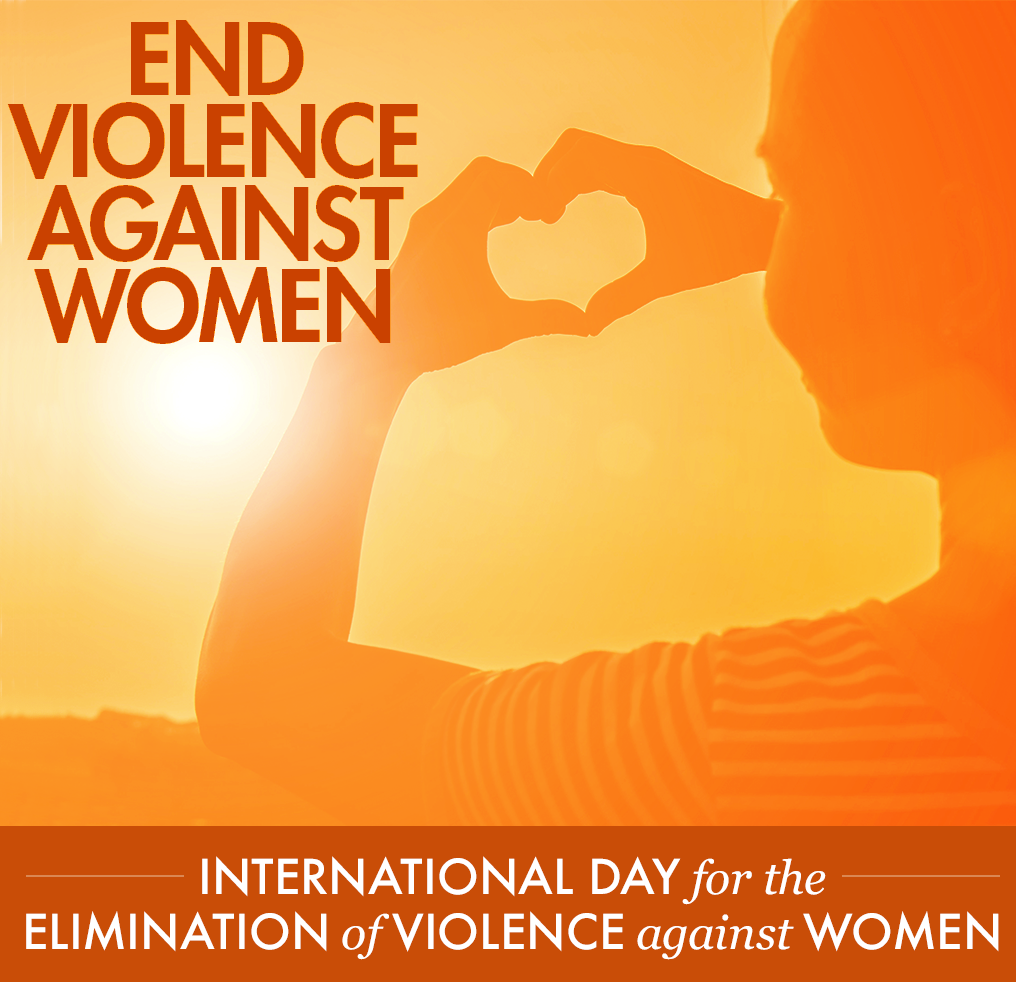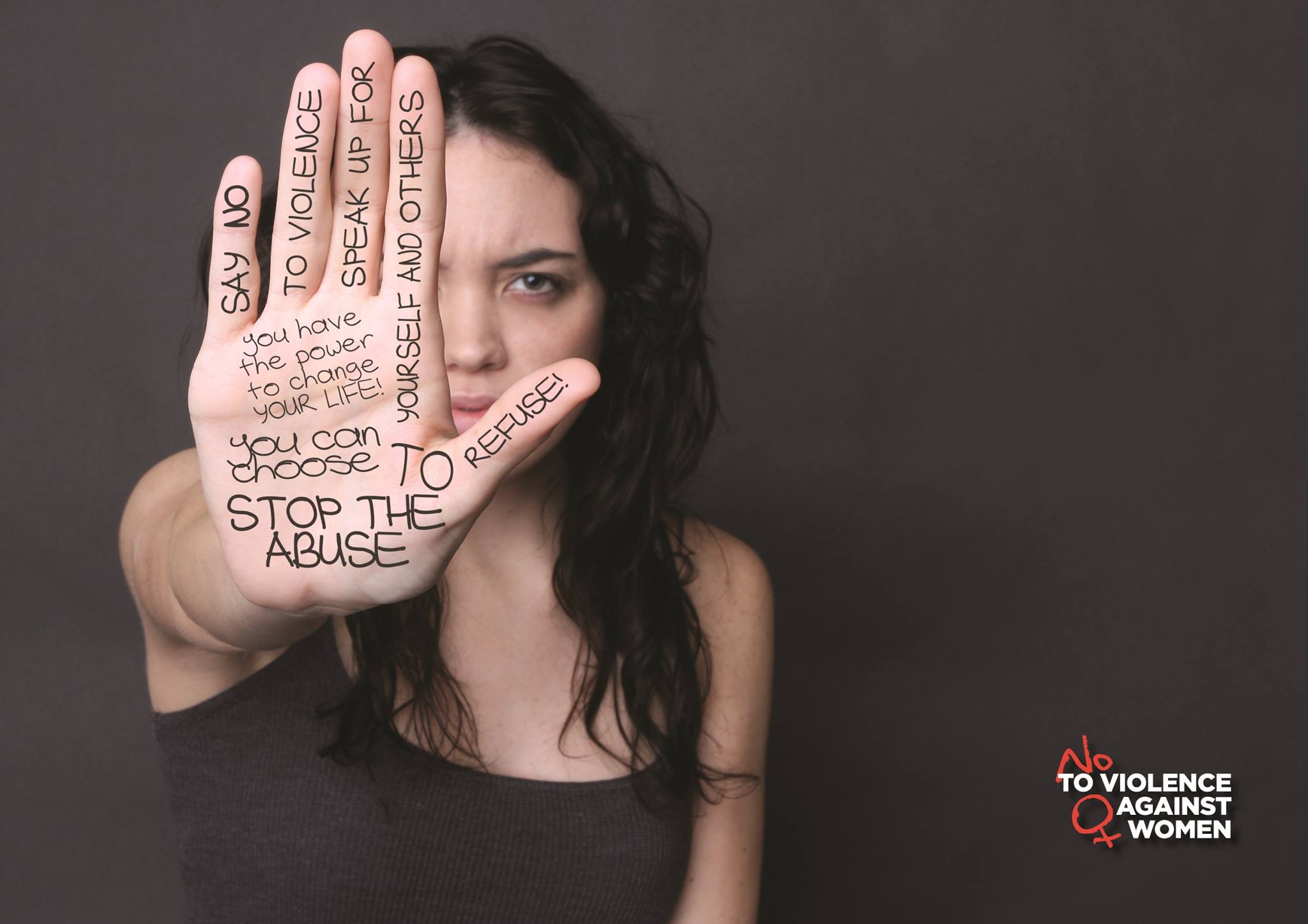The 2019 theme for the International Day for the Elimination of Violence Against Women is ‘Orange the World: Generation Equality Stands Against Rape’.
Like in previous years, this year’s International Day will mark the launch of 16 days of activism that will conclude on 10 December 2019, which is International Human Rights Day.

Violence against women and girls (VAWG) is one of the most widespread, persistent and devastating human rights violations in our world today remains largely unreported due to the impunity, silence, stigma and shame surrounding it.
In general terms, violence against women manifests itself in physical, sexual and psychological forms, encompassing:
- intimate partner violence (battering, psychological abuse, marital rape, femicide);
- sexual violence and harassment (rape, forced sexual acts, unwanted sexual advances, child sexual abuse, forced marriage, street harassment, stalking, cyber- harassment);
- human trafficking (slavery, sexual exploitation);
- female genital mutilation; and
- child marriage.
Finding Answers
Prevention must start early in life, by educating and working with young boys and girls promoting respectful relationships and gender equality. Working with youth is a “best bet” for faster, sustained progress on preventing and eradicating gender-based violence. While public policies and interventions often overlook this stage of life, it is a critical time when values and norms around gender equality are forged.
1. Seek Help Immediately
If you are feeling in danger, ring the Police immediately. If you are not in immediate danger but need support,
If you hear or see a violent or abusive situation happening, don’t turn your back. If it is safe you could try to defuse the situation by intervening. But if you feel that may be dangerous, or if you think a person is being hurt or about to be hurt, you should ring the Police immediately.
2.Stay Informed & Educate Yourself
Educate yourself about the causes, drivers and consequences of violence against women. Learn more about domestic and family violence and sexual violence and help spread that knowledge.
It is important to understand violence against women in terms of power dynamics and social structures, rather than just as purely individual experiences. Violence against women and children occurs within a patriarchal society where male dominance and privilege are normalised. Violence is used as a means of coercion and control over a woman or a partner and has nothing to do with one’s personal traits. Sexual violence is an abuse of power too. Men rape women because they believe women are possessions, not equals, and that they have a right to women’s bodies. Myths like this place responsibility on women and encourage more victim-blaming.
3.Use Empowering Language
Language matters. If you are a supporter speaking in public or at a community event, avoid referring to women who had violence inflicted on them as ‘victims’ as that term may not reflect a woman’s full identity, but instead define her in terms of something that is only part of her experience. A better choice would be using ’victim / survivor’ terminology as it acknowledges the crime committed against a woman while at the same time recognising her agency and life beyond violence.
4.Respond to Someone Disclosing Violence Appropriately
If you need to support someone who has disclosed to you the violence inflicted on them, or who has asked you for help, language matters immensely. Whoever it may be, your friend, colleague or family member, respond appropriately and make sure that she feels supported and encouraged to talk to you and seek help. Listen and believe. Never dismiss family violence as a just “a domestic” or suggest that sexual violence might have been a “misunderstanding”. Provide support. Sometimes practical assistance such as assisting with shopping or picking children up from school (with proper authorisation) can be of great help.
Never judge or blame a woman about the violence, regardless of the circumstances or her background.
5.Ethics for victim / survivors
No matter what you do, you should always treat a woman who has experienced violence in a dignified, respectful and ethical way. In practice this means accepting an experience without judgement and treating a woman as an individual and not through the prism of your stereotypes about her cultural, religious, economic or social background or affiliations. This encompasses both the language you are using and the kinds of support you are offering.
Be aware that if you make inappropriate comments about a woman’s social position, this may reinforce the power dynamics that contribute to the violence and result in victim-blaming.
6.Speak Up

Violence is never okay. Challenge practices that condone violence against women and encourage others to speak up. Sexist jokes are never okay no matter the circumstances they are told in or the position of a teller. Don’t be a ‘bystander’. Speak out about or seek to engage others in responding to specific incidents of sexism, discrimination or violence against women. It’s okay to criticise a friend if he continually makes sexist jokes. After all, part of being a friend is being able to tell you the truth if you behave inappropriately. If you can, confront colleagues whose comments are sexist, blame the victim or minimise issues of violence.
At place of work, if you are a manager, make sure that everyone in the office is treated fairly and has the chance to reach their potential. Don’t let your perception of their gender distort your decisions. If you are a graphic designer or working in advertising, avoid using women’s bodies to advertise unrelated products. Women’s bodies of all shapes and colours are beautiful, but women are people first, not decorations.
If you are involved in sport as a player, coach or official, challenge others who use sexist sledging on the sports field, and work to increase women’s and girls’ access to your sport. Sport is about playing according to the rules, and this should be one of them. If you are coach of boys, get a Coaching Boys into Men toolkit, which is focused on building respect, integrity and non-violence.
7.Be Limitless.
Promote and normalise gender equality in public and private life. If you are a parent, bring your kids up with the idea that they are limitless in their potential. Their gender should not determine their future. If you have friends with kids, buy them books that challenge rigid, imposed gender roles and stereotypes. Learn more about the issues by reading the Power of Parents snapshot report by Our Watch.
Speak about equal and respectful relations between and among women and men, girls and boys, women and women, men and men, whatever the consenting combinations are. Be the role model yourself. Promote women’s independence and decision-making in public life and relationships.
8.Donate & Fundraise
As an individual, donate money to organisations working with victims / survivors of family, domestic or sexual violence. Consider also supporting organisations working to advance gender equality, economic and political participation of women or providing free legal advice or health-related services and representation to women.
You can also attend public awareness events in your community or organise one. Get your friends and colleagues to do the same. Just make sure that if you are organising an event, you are speaking appropriately and proving the support that is needed. Check with your local organisations about what kind of support they really need.
9. Stand for a Systemic Change
To achieve systemic and long-lasting change, become a member of your local, state or national organisation working to end violence against women.
If the need arises write a letter to your local members asking them to lobby for appropriate reforms and to increase funding for specialist women’s services and community legal centres. Some tips to help get your voices heard by your local MP include make it relevant to the local context, handwritten letters gain more attention, ask them to do something specific and keep following up on their progress.
10. Care About Yourself
For some people, ending violence against women starts from a personal survival story, or the story of a loved one. For others, it’s more a matter of justice and equality. As you get more involved in helping others or yourself, do not forget to care for your own mental health and wellbeing.
Be a Proud Woman.
Thanks:
Disclaimer
The Content is not intended to be a substitute for professional medical advice, diagnosis, or treatment. Always seek the advice of your physician or other qualified health provider with any questions you may have regarding a medical condition.